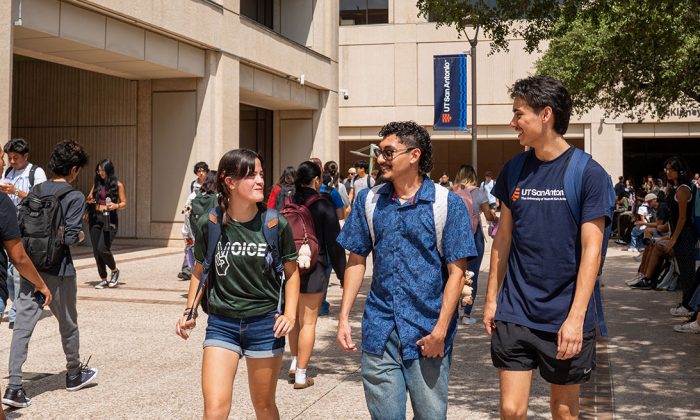A unique university partnership is now providing Alamo Colleges District staff members the opportunity to advance their career, bridging barriers for district employees looking to earn the higher-level degrees needed for leadership roles in the district.
Since 2015, the Department of Educational Leadership and Policy Studies at UT San Antonio has offered a tailored master’s degree in higher education program on-site at Alamo Colleges campuses.
In addition to preparing the graduate students for leadership roles, the program also seeks to provide them with new tools to better advocate for students and engage in policy discussions. The program is in its fifth year.
The 2024-2025 Alamo Colleges cohort is the largest group to date, with 17 students representing every Alamo College campus, the district office and an extension office. As this cohort nears graduation and the next round of recruitment begins, UT San Antonio and Alamo Colleges have renewed the program for another five years.
“UT San Antonio and Alamo Colleges have seen a lot of benefits related to this partnership,” said Vanessa Sansone, associate professor in the Department of Educational Leadership and Policy Studies at UT San Antonio and Alamo Colleges Cohort program coordinator.
Leading at the community college level
More than 40 alumni have participated in the program, earning a master’s degree in Higher Education Administration, and now work in higher education administration positions across South Texas, she added. “We’re just beginning with the Alamo Colleges cohort, and it’s really exciting to think about what else we can do and what more we can affect in higher education.”
Rosario Espinoza, a member of the Alamo Colleges cohort and the off-site coordinator at the Workforce Center of Excellence, said the opportunity has been meaningful to him.
“In my 12 years at the Alamo Colleges, I have heard that if you want to get to a director position, you need to have a master’s degree or a doctorate,” Espinoza said. “I hope to put my foot forward as director at the Workforce Center of Excellence. It’s truly a build-out of not just the center, but my own career and pathway. As I grow and learn, I can bring that back to grow the center.”
Unlike traditional graduate programs with a curriculum focused only on staff who work at four-year universities, this program targets the specific skills and knowledge required to lead at the community college level.
“We want to train and prepare education professionals who are interested in learning about higher education governance, assessment, and theory,” Sansone said.
“The focus of our program centers community colleges and prepares future community college leaders to transform systems that often overlook the unique contributions of these institutions,” Sansone said. “People are going to graduate from our program prepared, not only for the needs of Alamo Colleges, but also for community college leadership across the United States.”
Networking with peers and professors
The program emphasizes in-person networking and relationships, setting it apart from similar degree plans. The on-site, in-person format creates a relational component that encourages networking with peers and professors.
“If I had joined UT San Antonio outside of the cohort, any college, any master’s program, I would absolutely be more isolated in my learning and be less prepared,” Espinoza said. “This partnership between the university and Alamo Colleges has built strong higher education professionals. It definitely feels like it’s building us into something to elevate the Alamo Colleges.”
Alexandro Luna, member of the cohort and student conduct officer at Palo Alto College, also appreciated the access to faculty and feedback he received in the program.
“I have gotten so much support, praise, but more importantly, encouragement from everyone involved,” Luna said. “The program advisor sees the best potential in each and every one of us, and also I have new friends within this cohort … I can support, reach out to and collaborate with. This was just the best decision I could have made for myself at the time.”
The common bond of working for Alamo Colleges, Luna said, benefits students and is often mentioned in their classroom discussions.
“They’re able to understand exactly what I’m going through because they work at the same district,” he said. “They share the challenges. They share the success.”
In response to the financial barriers that can prevent working adults from pursuing graduate education, UT San Antonio and Alamo Colleges designed the program to be as accessible and affordable as possible.
Professional confidence
Classes are held on the San Antonio College campus, minimizing commute times and costs, and faculty utilize open education resources through UT San Antonio’s robust library services. The university also waives some fees.
“Being able to attend school at an Alamo College facility is extremely helpful with not having to drive all the way across town or even through downtown,” said Kimberly Abrego, a member of the cohort and Student Success Advisor for the Alamo Colleges District. “Also offering the classes in the evenings two nights a week is very helpful. I’m able to pursue a graduate degree knowing that on the weekends, I can still be present for my family.”
For Luis Sevilla ’23, the Alamo Colleges cohort program was transformative, turning self-doubt into professional confidence. “When they told me ‘you belong here,’ it was the first time I truly believed in my potential,” he said.
As an academic advisor with a goal to teach, Sevilla sees his degree as more than an academic achievement. “I would do this 10 times over,” he said. “The program isn’t just about earning a degree; it’s about breaking down barriers and creating opportunities for future students.”
UT San Antonio also plans to launch a hybrid-online master’s degree in Higher Education Administration program in Spring 2026. This inaugural cohort will include multiple Community Colleges campuses with nearly 10,000 community college staff.
This expansion reinforces the university’s commitment to flexible, affordable graduate education and positions the university as the leading institution in Texas for developing community college leaders, while expanding opportunity and access statewide.


